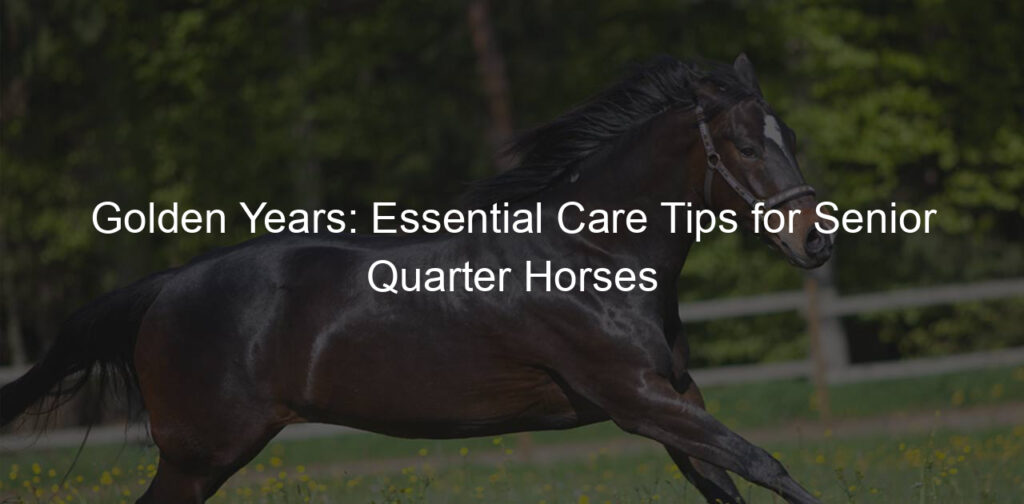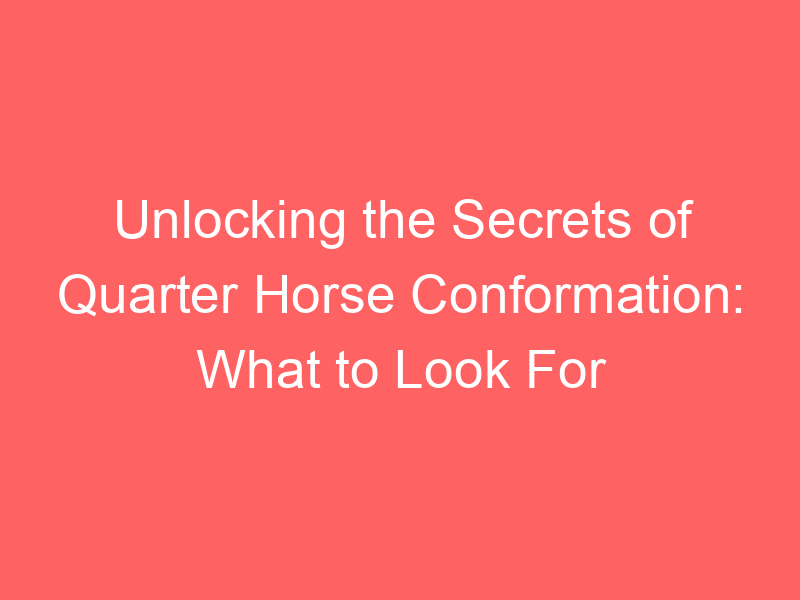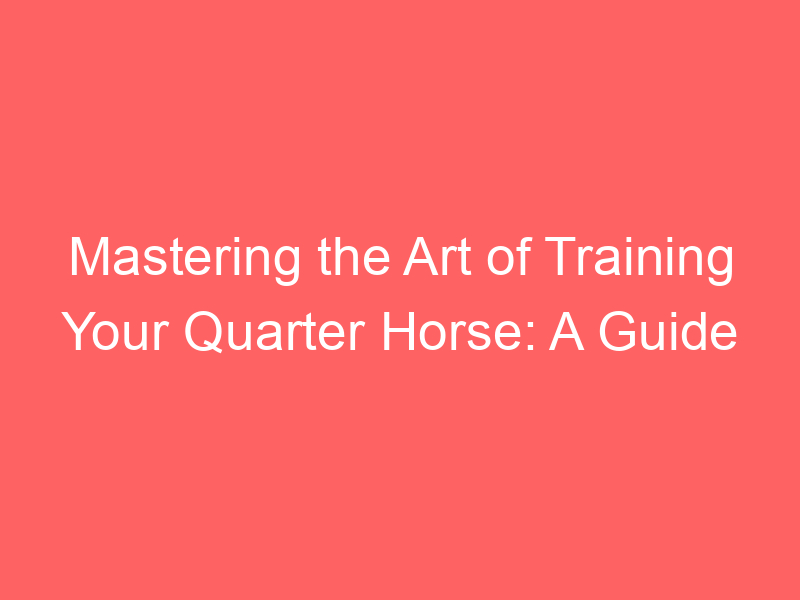Introduction to Senior Quarter Horses Care
Hey there, horse lovers! Today, we’re going to talk about a topic that’s close to our hearts – caring for our aging Quarter Horses. Just like us, our four-legged friends need a little extra TLC as they grow older. So, let’s dive right in and learn how we can make their golden years truly golden!
- Understanding the importance of specialized care for aging Quarter Horses
- Recognizing the signs of aging in Quarter Horses
As our Quarter Horses age, their needs change. They may not be able to run as fast, jump as high, or eat the same foods they used to. That’s why it’s so important to provide them with specialized care tailored to their age and health condition. This can help them stay comfortable, healthy, and happy for as long as possible. Remember, a little extra care can go a long way in ensuring the quality of life for our beloved horses.
So, how do you know when your Quarter Horse is starting to age? Well, there are a few signs to look out for. These can include things like a decrease in activity level, weight loss or gain, changes in their coat color and condition, and difficulty chewing or swallowing. It’s important to keep a close eye on your horse and consult with a vet if you notice any of these signs. Early detection and intervention can make a big difference in managing the aging process.
So, there you have it, folks! A quick introduction to caring for our senior Quarter Horses. Stay tuned for more tips and insights in our upcoming sections. Remember, our horses have given us their best years. It’s only fair we do the same for them in their golden years.
Understanding the Quarter Horse Aging Process
Hey there, horse lovers! Today, we’re going to explore the fascinating world of Quarter Horses, specifically their aging process. So, saddle up and let’s get started!
Senior Quarter Horse Lifespan
Just like us humans, horses age too. But have you ever wondered how long a Quarter Horse typically lives? Or what factors can influence their lifespan? Let’s find out!
- Typical lifespan of a Quarter Horse
- Factors that influence the lifespan of a Quarter Horse
On average, a Quarter Horse can live between 25 to 30 years. That’s a pretty long time, isn’t it? But remember, this is just an average. Some Quarter Horses have been known to live well into their 30s and even 40s! It’s all about providing them with the right care and attention.
Several factors can influence how long a Quarter Horse lives. These can include things like genetics, diet, exercise, and overall health care. For instance, a horse with good genes, a balanced diet, regular exercise, and proper veterinary care is likely to live longer than one without these.
Understanding the aging process of a Quarter Horse can help you provide the best care for your equine friend. So, keep these facts in mind, and your horse will thank you for it!
Physical Changes in Aging Quarter Horses
As our beloved Quarter Horses grow older, they undergo various physical changes. It’s important to understand these changes to provide the best care for them. Let’s take a look at some of these changes:
- Changes in body condition and muscle tone
- Changes in coat and skin condition
As Quarter Horses age, they may lose some of their muscle tone. This is a natural part of the aging process. They might not be as strong or as agile as they once were. Their bodies might also start to look a bit different. They might lose weight or gain weight, depending on their diet and exercise routine. It’s important to keep an eye on their body condition and make sure they’re getting the right amount of food and exercise.
Another change you might notice in your aging Quarter Horse is in their coat and skin condition. Their coat might not be as shiny or as smooth as it used to be. They might also develop skin issues, like dryness or itchiness. Regular grooming can help keep their coat and skin healthy. It’s also a good idea to have a vet check them out if you notice any major changes in their coat or skin.
Remember, these changes are a normal part of aging for Quarter Horses. With the right care and attention, your horse can still enjoy a happy and healthy life in their golden years.
Caring for Old Quarter Horses
When it comes to caring for our beloved old Quarter Horses, it’s important to pay special attention to their nutrition. As they age, their dietary needs change, and it’s our responsibility to ensure they get the nutrients they need to stay healthy and happy.
Senior Quarter Horse Nutrition
Just like humans, horses’ nutritional needs change as they age. Let’s take a closer look at how we can adjust their diet and why regular dental checks are so important.
- Adjusting diet for senior Quarter Horses
- Importance of regular dental checks for effective nutrition
As our Quarter Horses grow older, they may need fewer calories but more of certain nutrients. For instance, they might require more fiber and less sugar. It’s also essential to provide them with plenty of clean, fresh water. You can also consider adding supplements to their diet, but always consult with your vet first.
Did you know that a horse’s teeth keep growing throughout its life? This means that dental problems can develop, especially in older horses. Regular dental checks can help spot issues early and ensure your horse can chew its food properly. After all, even the best diet won’t do much good if your horse can’t eat it!
In conclusion, caring for an old Quarter Horse’s nutrition involves adjusting their diet and ensuring their teeth are in good shape. Remember, every horse is unique, so it’s always best to work with a vet to create the best diet plan for your horse.
Exercise for Senior Quarter Horses
Just like humans, horses need regular exercise to stay fit and healthy, especially as they age. For our beloved senior Quarter Horses, exercise is even more crucial. Let’s dive into the benefits of regular exercise and some recommended routines for our aging equine friends.
- Benefits of Regular Exercise for Senior Quarter Horses
- Recommended Exercise Routines for Aging Quarter Horses
Regular exercise for senior Quarter Horses has numerous benefits. It helps to maintain a healthy weight, reducing the risk of diseases like Equine Metabolic Syndrome. Exercise also keeps their joints flexible, reducing the risk of arthritis. It enhances their mental health too, keeping them active and engaged.
When it comes to exercise routines for our aging Quarter Horses, it’s essential to consider their health status and physical capabilities. A gentle walk or trot for 20-30 minutes a day can be a great start. Incorporating activities like Equine-assisted therapy can also be beneficial. Remember, it’s always best to consult with a veterinarian before starting any new exercise routine.
Exercise is a key component in caring for our senior Quarter Horses. It keeps them healthy, happy, and active in their golden years. So, let’s make sure our equine friends get the exercise they need and deserve!
Health Issues in Aging Quarter Horses
Just like humans, horses also face health issues as they age. In particular, Quarter Horses, known for their agility and speed, can encounter specific health problems. Let’s take a closer look at some of the most common ones.
Common Health Problems
- Arthritis and Joint Issues in Senior Quarter Horses
- Digestive Problems in Aging Quarter Horses
Arthritis is a common health problem in aging Quarter Horses. This condition can cause stiffness, pain, and difficulty in movement. It’s mainly due to the wear and tear of the joints over time. According to Wikipedia, arthritis affects one in five adult horses, with higher rates in older horses. Regular exercise and proper diet can help manage this condition.
As Quarter Horses age, their digestive system becomes less efficient. This can lead to problems like colic, weight loss, and poor nutrient absorption. It’s important to monitor their diet and ensure they’re getting enough fiber and hydration. According to a Wikipedia study, colic is a leading cause of death in horses, making it crucial to address any digestive issues promptly.
Understanding these common health issues can help us provide better care for our aging Quarter Horses. Remember, early detection and proper management can significantly improve their quality of life.
Preventive Care for Elderly Quarter Horse Health
As our beloved Quarter Horses grow older, their health needs change and evolve. It’s our responsibility as their caregivers to ensure they’re receiving the best possible care. This includes regular veterinary checks and keeping up with their vaccination and deworming schedules. Let’s dive into these two crucial aspects of preventive care for elderly Quarter Horses.
- Regular veterinary checks for early detection of health issues
- Vaccination and deworming schedules for senior Quarter Horses
Regular veterinary checks are a key part of preventive care for senior Quarter Horses. These check-ups allow for early detection of potential health issues, which can make a significant difference in the horse’s quality of life. A vet can spot subtle changes in your horse’s health that you might miss. They can also provide valuable advice on diet, exercise, and other aspects of care tailored to your horse’s age and condition. Remember, early detection can often mean easier and more effective treatment!
Keeping up with your senior Quarter Horse’s vaccination and deworming schedule is another important aspect of preventive care. As horses age, their immune systems can become less effective at fighting off diseases and parasites. Regular vaccinations can help protect your horse from diseases like equine influenza, tetanus, and West Nile virus. Deworming, on the other hand, helps keep internal parasites at bay. Your vet can provide a customized vaccination and deworming schedule based on your horse’s age, health status, and lifestyle.
Remember, preventive care is all about maintaining your horse’s health and happiness in their golden years. It’s about catching potential problems before they become serious, and ensuring your horse is protected against preventable diseases. So, keep up with those vet checks and vaccination schedules, and your senior Quarter Horse can continue to enjoy a high quality of life!
Quarter Horse Senior Care Tips
When it comes to caring for our senior Quarter Horses, it’s all about making sure they’re comfortable and happy. Here are some tips on how to create a cozy environment for your aging equine friend.
Creating a Comfortable Environment
As your Quarter Horse ages, their needs will change. It’s important to adapt their environment to these changes to ensure they remain comfortable and healthy. Here are some key areas to focus on:
- Providing adequate shelter and bedding
- Ensuring easy access to food and water
Just like us, older horses need a comfy place to rest. Make sure your horse has a clean, dry, and warm shelter. This can be a stable or a well-constructed run-in shed. The bedding should be soft and thick enough to provide cushioning for their aging joints. Straw or wood shavings are great options for bedding.
As horses age, they may struggle with mobility. Make sure their food and water are easily accessible. Automatic waterers or a simple bucket can work well, as long as it’s kept clean and filled. For food, consider using a ground-level feeder to make it easier for your horse to eat. Remember, senior horses may need a special diet, so consult with your vet for the best feeding plan.
By focusing on these two areas, you can create a comfortable environment for your senior Quarter Horse. Remember, every horse is unique, so it’s important to pay attention to their individual needs and preferences.
Mental Health and Socialization
Just like us humans, horses, especially the senior Quarter Horses, need companionship and mental stimulation to stay happy and healthy. Let’s dive into why it’s important and how we can help them.
- Importance of companionship for senior Quarter Horses
- Enrichment activities for aging Quarter Horses
Senior Quarter Horses, just like any other horse breed, are social animals. They thrive on companionship, whether it’s with other horses or with their human caretakers. Companionship can help them combat loneliness, reduce stress, and even improve their physical health. According to a study, horses that have companions tend to live longer and healthier lives. So, make sure your senior Quarter Horse has a buddy to hang out with!
Keeping your senior Quarter Horse mentally stimulated is just as important as taking care of their physical health. Enrichment activities can help keep their minds sharp and active. These activities can range from simple games like hide and seek with treats, to more complex tasks like puzzle feeders. You can also try teaching them new tricks or commands, as learning new things can help keep their minds sharp. Remember, a mentally stimulated horse is a happy horse!
So, don’t forget to spend quality time with your senior Quarter Horse and engage them in fun and stimulating activities. They’ll thank you for it!
Conclusion: Ensuring Quality of Life in the Golden Years
As we wrap up our discussion on senior Quarter Horse care, we want to emphasize a few key points. The golden years of a Quarter Horse can be filled with joy, comfort, and quality of life, but this requires our dedicated care and attention.
- Emphasizing the importance of regular care and attention
- Reiterating the role of a balanced diet and exercise
Regular care and attention are the cornerstones of ensuring a good quality of life for your aging Quarter Horse. This includes regular vet check-ups, grooming, and monitoring for any changes in behavior or appearance. Remember, you know your horse best! If something seems off, it’s always better to get it checked out. Horse care is a daily commitment, and your senior horse deserves nothing less.
A balanced diet and regular exercise play a crucial role in keeping your senior Quarter Horse healthy and happy. As horses age, their dietary needs change. It’s important to adjust their feed accordingly and ensure they’re getting all the necessary nutrients. Exercise, too, is vital. While your senior horse may not be able to gallop like they used to, gentle exercise can help keep them fit and prevent stiffness. For more information on this, check out this horse nutrition guide.
In conclusion, caring for a senior Quarter Horse may require a bit more effort and attention, but the rewards are immeasurable. Seeing your horse enjoy their golden years in comfort and happiness is a joy like no other. Remember, every horse is unique, and what works for one may not work for another. Always listen to your horse and provide the care they need. Here’s to many more happy years with your Quarter Horse!






